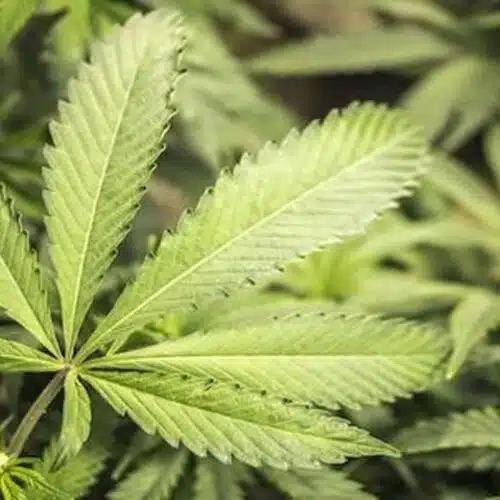Tourette Syndrome is a neurological condition characterized by uncontrollable body movements that are often repetitive in nature and referred to as “tics.” This can include blinking, twitching, shoulder shrugging, etc. The condition can also involve repeated and compulsive sounds, oftentimes characterized by offensive language and/or profane speech. Some scientific studies provide evidence that THC cannabinoids reduce symptoms of Tourette Syndrome.
The early symptoms of Tourette Syndrome (TS) are typically noticed first in childhood, with the average onset between the ages of 3 and 9 years. TS occurs in people from all ethnic groups; males are affected about three to four times more often than females. It is estimated that 200,000 Americans have the most severe form of TS, and as many as one in 100 exhibit milder and less complex symptoms such as chronic motor or vocal tics. Although TS can be a chronic condition with symptoms lasting a lifetime, most people with the condition experience their worst tic symptoms in their early teens, with improvement occurring in the late teens and continuing into adulthood.
Behavioral issues including hyperactivity, impulsivity and aggression are also common. Children with Tourette’s often have cognitive and learning disabilities associated with the condition, requiring individualized education planning.
Although the symptoms of Tourette Syndrome are involuntary, some people can sometimes suppress, camouflage, or otherwise manage their tics in an effort to minimize their impact on daily functions. However, people with TS often report a substantial buildup in tension when suppressing their tics to the point where they feel that the tic must be expressed (against their will). Although tics in response to an environmental trigger can appear to be voluntary or purposeful, they are not.
Traditional Treatment For Tourette Syndrome
There are currently numerous pharmaceutical treatments used for Tourette’s, including:
- Haloperidol – an antipsychotic agent. Exactly how it works is not known, but it may work by blocking certain chemicals in the brain. It is also used for treating schizophrenia.
- Risperidone – a antipsychotic medicine. It works by changing the effects of chemicals in the brain. Also used to treat schizophrenia and symptoms of bipolar disorder (manic depression). It is also used in autistic children to treat symptoms of irritability.
- Pimozide – an antipsychotic medication. It works by changing the actions of chemicals in the brain. Pimozide is used to suppress the motor and phonic tics associated with Tourette’s disorder.
- Aripiprazole – used to treat the symptoms of psychotic conditions such as schizophrenia and bipolar disorder (manic depression).
Neurologist and psychiatrists can be involved in the treatment of the condition, while behavioral therapies and relaxation techniques are often employed.
How THC Cannabinoids Help Reduce Symptoms of Tourette’s
There have been numerous clinical trials that have displayed profound success in treating Tourette’s with the THC cannabinoid. As low as a 2.5mg dose of THC has been proven effective in significantly reducing tics. These results begin with a 2.5mg dose of THC that is increased to 5, 7.5 and 10 mg doses over a four-day time period for six weeks.
THC & CBD in Medical Marijuana
THC, or tetrahydrocannabinol, is the chemical responsible for most of marijuana’s psychological effects. According to the National Institute on Drug Abuse (NIDA), THC acts much like the cannabinoid chemicals made naturally by the body.
Cannabinoid receptors are concentrated in certain areas of the brain associated with thinking, memory, pleasure, coordination and time perception. THC attaches to these receptors, activates them and affects a person’s memory, pleasure, movements, thinking, concentration, coordination, and sensory and time perception.
THC is one of many compounds found in the resin secreted by glands of the marijuana plant. More of these glands are found around the reproductive organs of the plant than on any other area of the plant. Other compounds unique to marijuana, called cannabinoids, are present in this resin. According to the National Center for Biotechnology Information, one cannabinoid, CBD, is nonpsychoactive and blocks the high associated with THC.
Cannabidiol, or CBD, is the cannabis compound that has significant medical benefits, but does not make people feel “stoned” and can actually counteract the psychoactivity of THC. The reason why CBD is non-psychoactive is due to its lack of affinity for CB1 receptors. CB1 receptors are found in high concentrations in the brain, and are the pathways responsible for the psychoactive effects of THC.
CBD and THC levels tend to vary between different strains and varieties of cannabis. By using selective breeding techniques, strands with high levels of CBD and THC have been created.
Previous studies provide evidence that marijuana and delta-9-tetrahydrocannabinol, or Delta(9)-THC — the major psychoactive ingredient of marijuana — are effective in treating Tourette Syndrome tics and behavioral problems. It has been speculated that the central cannabinoid receptor system might be involved in Tourette Syndrome pathology.
Results from this study corroborate previous data suggesting that in patients suffering from Tourette’s, treatment with Delta(9)-THC causes neither acute nor long-term cognitive deficits.
Treatment Process
The administration of cannabis capsules for Tourette’s is the most common delivery method reported in clinical trials. Anecdotal reports of relief from symptoms from the smoking and vaporizing of cannabis has also been documented.
Case Study
As reported in the March 1999 issue of the American Journal of Psychiatry, researchers at Medical School of Hannover in Germany reported that a 25 year old male had his total tic severity score reduced from 41 to seven within two hours of a 10 milligram dose of THC. The improvement lasted for seven total hours.
For the first time, patients’ subjective experiences when smoking marijuana were confirmed by using a valid and reliable rating scale. – American Journal of Psychiatry
A data review published in a 2003 issue Expert Opinions in Pharmacotherapy, confirmed that THC has successfully treated Tourette’s. This review recommended adult sufferers try the treatment should traditional treatment fail to reduce symptoms. A 2013 study similarly concluded, “By many experts THC is recommended for the treatment of TS in adult patients, when first line treatments failed to improve the tics. In treatment resistant adult patients, therefore, treatment with THC should be taken into consideration.” This data clearly demonstrates how THC cannabinoids reduce symptoms of Tourette Syndrome.
Following Maine’s 2013 decision to keep Tourette Syndrome off their list of medical marijuana qualifying conditions, Dr. Dustin Sulak and one of his patients were interviewed for local television, and demonstrated the profound effect cannabis has on the disorder. The results were immediate and lasted up to two hours via both smoked and vaporized cannabis. As the patient described, “just one puff” produced dramatic relief of Tourette’s symptoms.


